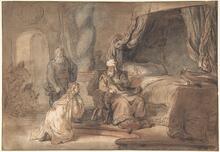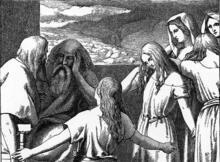Shelomith 1: Midrash and Aggadah
Shelomith’s narrative is used by the Rabbis as the exception that proves the rule of Israelite marital fidelity while in Egyptian servitude. One tradition relates that her son was born out of wedlock with an Egyptian man who deceived her, while another says that her son was fathered by an Egyptian man after the former murdered her Israelite husband. Shelomith’s illegitimate son is punished for his parentage, although the midrash criticizes the harshness of Moses’ judgement.
Midrashic Descriptions
The Rabbis describe Shelomith daughter of Dibri as being good-looking, and her name attests that she was perfect (shelemah) and flawless (Tanhuma, Shemot, para. 9). Alternately, she was talkative, and she was called “daughter of Dibri [bat Dibri]” because she would talk (le-daber) incessantly with everyone and would greet every individual with: “Shalom to you,” thus explaining her name: Shelomith. Some Rabbis blame her loquaciousness for her engaging in forbidden sexual relations, which resulted in the birth of a son who was doomed to die (Lev. Rabbah 32:5).
The Rabbis maintain that the phenomenon during the Egyptian servitude of Israelite women being married to Egyptians was rare, and the specific mention of the forging of such a bond with Shelomith teaches how exceptional this instance was. The Rabbis note that Israel were redeemed from Egypt for four reasons: (1) they did not change their Hebrew names while in Egypt; (2) they did not change their language but continued to speak in Hebrew; (3) they did not engage in slander, and no one informed on his fellow Israelite; and (4) they did not engage in licentious behavior. Shelomith daughter of Dibri was the exception mentioned by the Torah she-bi-khetav: Lit. "the written Torah." The Bible; the Pentateuch; Tanakh (the Pentateuch, Prophets and Hagiographia)Torah that proved the rule of Israelite marital fidelity (Lev. Rabbah 32:5).
Shelomith’s Husband and Son
Several midrashim stress that although Shelomith’s son was the child of an Egyptian man, she was not married to her son’s father, and the entire incident is presented (from her perspective) as a sorry mistake. The Egyptian taskmasters would wake the Hebrews at the crack of dawn every morning for their slave labor. To do this, the taskmasters would enter the houses of the Israelites. When one of the taskmasters entered Shelomith’s tent, he was struck by her beauty and desired her. One dawn, after the taskmaster had sent her husband to his daily labor, he returned to Shelomith and lay with her; in the darkness, Shelomith thought that he was her husband. When Shelomith’s husband returned, he saw the Egyptian taskmaster leaving his house. He asked her: “Did he touch you?,” to which she replied: “Yes, and I thought that was you” (Ex. Rabbah 1:28).
Another tradition relates that Shelomith would return the taskmaster’s greeting; he became acquainted with her, and consequently demanded that she sin with him—a request to which she readily acquiesced (Sekhel Tov [ed. Buber], Ex. 2:11). The taskmaster knew that Shelomith’s husband sensed this and so, when the latter returned to his slave labor, the taskmaster beat the husband. This taskmaster was the Egyptian whom Moses saw when he went out to his kinsfolk, as related in Ex. 2:11–12. Moses witnessed, by the spirit of Divine inspiration, what the taskmaster had done to the Hebrew man, and he said: “Is it not enough that you have wronged his wife, you also strike him?” Realizing that the taskmaster deserved the death penalty, Moses struck him a fatal blow (Ex. Rabbah loc. cit.).
According to another tradition, the Egyptians would defile the wives of the Israelites. Shelomith was married to a man from her tribe of Dan. That night Pharaoh’s taskmasters came and killed her husband and then engaged in relations with her; a son was born from this encounter. Everything follows the seed: from sweet to sweet, and from bitter to bitter. Consequently, this child, the offspring of an Egyptian from an act of defilement, cursed the Lord (Pirkei de-Rabbi Eliezer, chap. 47). Lev. 24:11 provides his detailed genealogy: “Now his mother’s name was Shelomith daughter of Dibri of the tribe of Dan,” because this son was a disgrace to his mother, to his family and to his tribe (Lev. Rabbah 32:5).
Shelomith’s Son Curses the Lord
What was the quarrel that led Shelomith’s son to curse the Lord? In the Rabbinic account, he converted and wanted to pitch his tent within the encampment of Dan. The Danites asked him: “Why do you want to have your tent here?” He replied: “I am from the daughters of Dan.” They retorted: “But Scripture says: ‘The Israelites shall camp each with his standard, under the banners of his father’s house’ [Num. 2:2]. Although your mother is from the daughters of Dan, your father is not from the sons of Dan, and the encampment follows the father’s line, and not the mother’s.”
Shelomith’s son entered the court of Moses and asked for a judgment in his case. Moses ruled against him, declaring that he could not dwell among the Danites because he was a Lit. "bastard." Offspring of a relationship forbidden in the Torah, e.g., between a married woman and a man other than her husband or by incest.mamzer (bastard). The son left the court and blasphemed, using the fully-pronounced Name of the Holy One, which he had heard at Sinai (Sifra 14:1–2). This A type of non-halakhic literary activitiy of the Rabbis for interpreting non-legal material according to special principles of interpretation (hermeneutical rules).midrash is highly critical of the conduct of Moses and the Danites. Shelomith’s son tried to mend his ways: he converted and wanted to be part of his tribe, but they cast out the “Other” from their midst on the flimsiest of excuses. His isolation within society and the unwillingness of his tribe to accept him drove him to the extreme act of blasphemy, which resulted in his death.
A different tradition, however, praises Moses’s conduct in this situation. Moses knew that the son was a mamzer, but he did not divulge this to a soul, until the truth came out on its own during this episode (T Eduyot 3:4).










